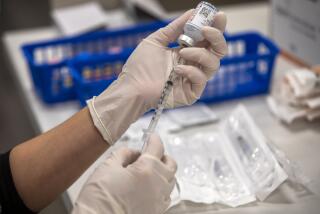All-Out Attack on Tooth Decay
- Share via
For much of the first half of the 20th century, Boston children could shell out a nickel and get their teeth cared for at the Forsyth Institute, a charitable institution in the Fens section of the city.
Today, Harvard University researchers working at Forsyth have developed a vaccine they hope will eliminate tooth decay, or dental caries--the disease that causes most childhood trips to the dentist.
For the record:
12:00 a.m. Aug. 6, 2001 For the Record
Los Angeles Times Monday August 6, 2001 Home Edition Health Part S Page 3 View Desk 2 inches; 46 words Type of Material: Correction
Tooth decay--A story in the July 23 Health section about efforts to develop a vaccine to eliminate tooth decay implied that the research is taking place at Harvard University. The research is being carried out entirely at the Forsyth Institute, a research organization in Boston that is not affiliated with Harvard University.
“We decided to try to beat the disease rather than just drill and fill,” said Daniel Smith, an associate clinical professor at the Harvard Medical School and senior member of the research staff at Forsyth.
Smith and Dr. Martin Taubman, head of immunology at Forsyth and professor of oral biology at Harvard, report in this month’s issue of the journal Infection and Immunity that their new vaccine significantly reduced decay in the teeth of rats. The researchers said the findings are an important step toward their goal of developing a nasal spray that will vaccinate young children against dental caries.
Researchers in Alabama and England also have developed vaccines to attack dental caries.
Scientists’ decades-old quest to develop a vaccine against tooth decay has been hindered both by thorny scientific problems and by a perception that some tooth decay is inevitable though largely controlled by fluoride in water supplies and toothpaste.
While fluoride has reduced the amount of tooth decay in children, experts say, many adults and poor families in the United States and the developing world remain afflicted with the disease.
“There is a perception that with the great public health success of fluoride we have conquered dental caries. That just isn’t true,” said Dennis Mangan, chief of the infectious diseases and immunity branch of the National Institute of Dental and Craniofacial Research.
“Dental caries is an epidemic worldwide,” Smith said. “Even if you have fluoride, you still have the bug.”
Because few people view decay for what it is--a chronic infectious disease--there has been no huge demand for a cure, said Dr. Jason M. Tanzer, head of the division of oral medicine at the University of Connecticut Health Center, who also has done research on dental caries vaccines.
“One of the problems is that in the eye of the public, the disease is equated with the lesions,” Tanzer said. “The lesion is a cavity--it is an effect of the disease. The disease itself is the infection. As long as dentists only talk about a cavity, it doesn’t seem all that scary.”
At Forsyth, scientists have been developing cures for dental diseases for about the last 50 years. Today, they are taking dead aim at mutans streptococci , the bacteria that are the primary cause of dental caries.
As these bacteria digest sugars, they produce lactic acid, which eats into the enamel of teeth.
The targets of the Forsyth vaccine are a group of enzymes called glycosyltransferases, which are produced by the decay-causing bacteria and help them accumulate on the surface of teeth.
Animal studies have shown that blocking these enzymes can nearly eliminate dental caries.
Taubman and Smith want to boost production of antibodies contained in saliva known to blunt the effects of the enzyme. So they synthesized two segments of the enzyme that are responsible for the enzyme’s function. The joined synthetic enzyme segments are inhaled in a spray and trigger an immune reaction in saliva, preventing bacteria from binding to tooth surfaces.
“The vaccine seems to be better than the sum of its parts,” said Tanzer, reviewing Taubman’s and Smith’s work.
Tanzer says it has been more than a quarter-century since researchers, including himself and Taubman, showed the immune system could be mobilized to fight decay-causing bacteria.
But finding the right antigen--or the molecules that can stimulate a strong immune response--has been one of the difficulties in developing a vaccine, Tanzer said. And the immune response initiated in saliva turns out to be more short-lived than immune responses triggered by vaccines delivered into the bloodstream, he said.
“I used to think it was only a matter of years before we had a solution,” Tanzer said. “But clearly this is a problem not only of science, but of social perceptions and economics.”
That is because dental health hasn’t been a public health priority, researchers in the field say.
“Dental caries is a situation in which the urgency for new treatment pales besides such diseases as AIDS or hepatitis,” Taubman said.
But it is a disease for which new treatments are needed.
For instance, developing countries are on the verge of an epidemic of tooth decay, largely because of the introduction of Western sweets and particularly sucrose-laden soft drinks, Tanzer said. Many poor children in the United States have untreated tooth decay that can lead to severe social and health problems, according to a 1998 Surgeon General’s report. And, because tooth decay is a chronic disease, many adults continue to have problems with decay as they age, Smith said.
Taubman said Forsyth researchers are looking for a partner capable of making enough vaccine to start human trials. Unlike other vaccines under development that target young adults, the researchers want federal approval to vaccinate children at about 1 year of age. Vaccines will work best before bacteria take hold in the mouth, usually between 18 and 36 months of age, Taubman said.
“A vaccine doesn’t mean you’d stop using fluoride or trying to reduce the bugs ...,” Taubman said. “It’s a way to make those efforts more successful.”






